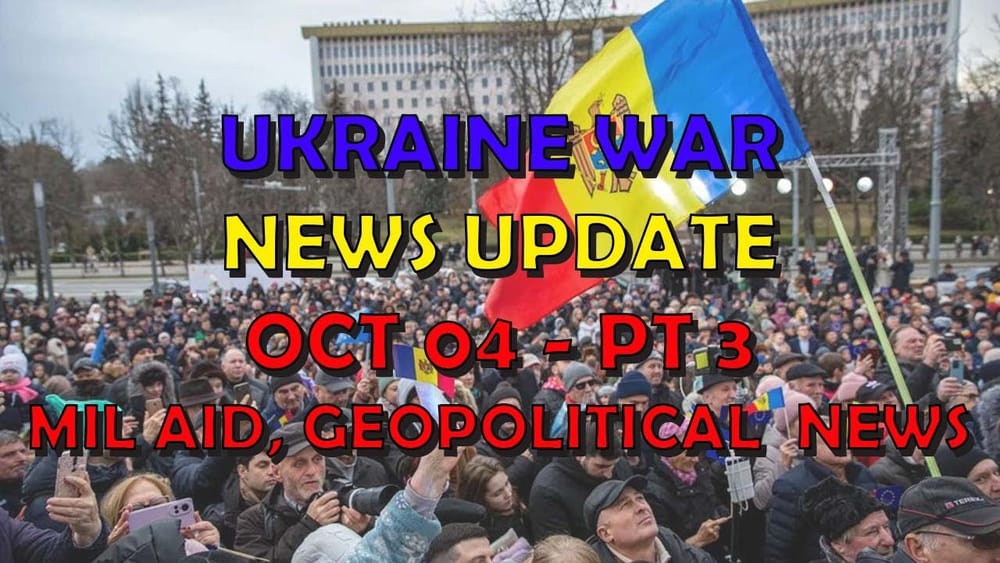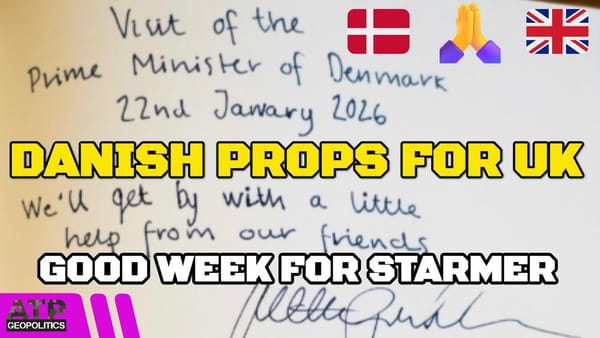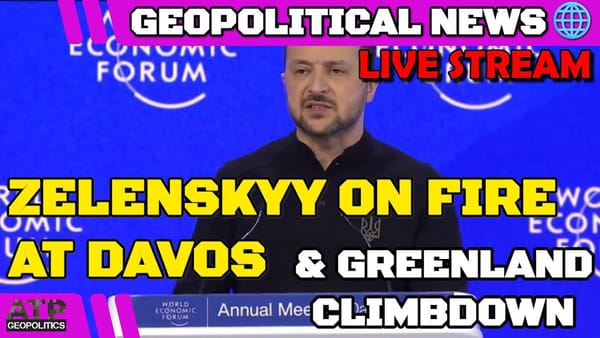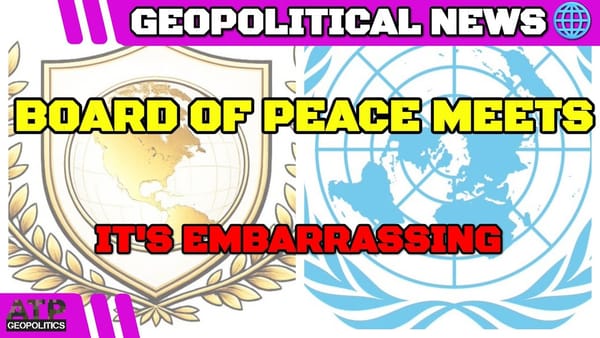Ukraine War Update NEWS: Military Aid & Geopolitical News
Table of Contents 📖
| Topic ID | Topic Title | Timestamp |
|---|---|---|
| 1 | Hello Team | 00:00-01:20⏩ |
| 2 | Ukraine | 01:20-18:37⏩ |
| 3 | Russia | 18:37-38:47⏩ |
| 4 | Georgia | 32:21-36:25⏩ |
| 5 | Hungary | 36:25-38:17⏩ |
| 6 | Switzerland | 38:17-38:47⏩ |
| 7 | Lithuania | 38:47-39:32⏩ |
| 8 | Pink Floyd | 39:32-41:22⏩ |
| 9 | Wrap up | 41:22-41:51⏩ |
"I tend to steer clear of people who actively support genocidal and autocratic dictators."
Hello Team
🎦 00:00-01:20⏩
Jonathan welcomes viewers to the third part of his Ukraine War Update series, focusing on military aid and geopolitical news. He also addresses a technical issue with a recent poll for channel members, encouraging them to re-submit their responses.
Return to top⤴️
Ukraine
🎦 01:20-18:37⏩
- Ukrainian Foreign Minister Dmytro Kuleba hints at "historic decisions" following a conversation with US Secretary of State Antony Blinken, suggesting potential significant developments in US support for Ukraine.
- A French-German manufacturer has signed a contract to produce and deliver 12 CAESAR self-propelled howitzers to Ukraine. Jonathan speculates that this order is in addition to the 78 CAESARs already pledged, bringing the total number potentially to 90.
- Jonathan highlights an article by Anne Applebaum in The Atlantic, which discusses Ukraine's significant increase in military production, particularly drone manufacturing. He notes a previous report mentioning a single Ukrainian facility producing 100,000 drones per month.
- Applebaum's article argues for increased Western support of Ukraine's military production, a shift in Western thinking away from "land for peace" negotiations, and recognition of Russia's unwillingness to end the war.
- The article emphasizes the need for Ukraine to prevail, framing the conflict as a struggle between democracy and autocracy. Jonathan expresses concern over what he perceives as a worrying trend of acceptance towards dictatorship in American politics.
- Jonathan analyzes the arrival of Swedish CB90 high-speed armoured combat boats to Ukraine, questioning their utility in defensive operations and speculating about their potential use in offensive actions, such as raids into Crimea.
- He notes reports of Russia increasing its production of unmanned sea vehicles (USVs), suggesting that this development might make the CB90s more valuable for Ukraine in countering Russian USV activity in the Black Sea.
- Jonathan discusses the Czech initiative to supply Ukraine with ammunition, noting that over a third of the planned ammunition has already been delivered. He connects this influx of ammunition to the reported improvement in Ukraine's artillery fire rate ratio from 8:1 to 3:1.
- He acknowledges the possibility that the improved fire rate ratio might be influenced by both increased Ukrainian ammunition supplies and the destruction of Russian ammunition depots, citing reports of "shell hunger" among Russian forces.
- Jonathan reports on the agreement signed by CSG and Junkerska Bronatechnika for the production of artillery ammunition in Ukraine, further boosting Ukraine's domestic ammunition production capabilities.
- He highlights the Czech Republic's continued support for Ukraine, with Czechia's Defense Minister accepting a donation of 3 million crowns (approximately $130,000) for Ukrainian villages.
- Jonathan commends Sweden's pledge of 2.4 million euros to support Ukraine's war crime investigations, noting the funds will be used to upgrade digital infrastructure for law enforcement and prosecutors.
- Jonathan discusses a statement by Ukrainian MP Roman Kostenko, who advocates for lowering the mobilisation age in Ukraine to 20. Kostenko criticizes what he claims is a reluctance among younger Ukrainians to defend the country and mentions US congressmen expressing frustration over Ukraine not mobilizing men under 25.
- Jonathan provides a nuanced perspective on the mobilization debate, acknowledging arguments both for and against mobilizing younger citizens. He suggests that the decision depends on Ukraine's long-term goals, weighing the immediate need for troops against the potential impact on demographics, the economy, and the future workforce.
- Jonathan showcases a Russian-developed anti-drone quadcopter equipped with nets under each propeller, highlighting its effectiveness in bringing down drones and the potential for capturing and re-using downed drones.
Russia
🎦 18:37-38:47⏩
- Jonathan reports that Gazprom, the Russian gas giant, was ranked as the most unprofitable company in Russia in 2023, with a record net loss of $6.1 billion. He finds it interesting that the company faces a massive tax burden despite being a primary source of income for the Russian government.
- He discusses an article from Politico which posits that Saudi Arabia's plan to increase crude oil production could significantly impact Russia's war funding. By increasing oil exports, Saudi Arabia aims to gain market share and profits even if oil prices fall.
- Jonathan explains the dynamics of OPEC and OPEC+, noting that Russia is a member of OPEC+. He details how OPEC's efforts to cut oil supply to drive up prices have backfired on Russia, as they voluntarily cut production while facing lower-than-desired prices per barrel.
- He suggests that the United States has contributed to the lower oil prices by flooding the market to control inflation, a move that has benefited the US economy and harmed Russia's.
- Jonathan summarizes an article from the Kyiv Independent, which echoes Politico's analysis of the threat posed by Saudi Arabia's oil production increase to Russia's war economy. He notes the potential for this strategy to cause a significant drop in oil prices, impacting Russia's oil and gas profits, which represent a significant portion of the country's federal income.
- He cites Alexandra Prokopenko, an economist at the Carnegie Endowment for International Peace, who estimates that a $20 drop in oil prices could result in a $20 billion loss in revenue for Russia.
- Jonathan highlights the challenging situation faced by Russia, as it either has to cut funding for its war efforts or accept growing inflation and higher interest rates.
- He points out that Russia's reliance on oil and gas profits, which have been used to fund its military operations, makes it vulnerable to fluctuations in oil prices.
- Jonathan discusses the Russian State Duma's proposal to introduce a "childlessness tax" to address the country's labor shortage and demographic decline, a trend observed in many Western countries and China. He notes the irony of a Russian official advocating for such a tax while the country is actively engaged in a war that has resulted in significant casualties and emigration, exacerbating the population decline.
- He highlights the introduction of a bill in the State Duma banning the "propaganda of child-free people," illustrating the Russian government's attempts to control narratives and promote population growth.
- Jonathan reports on Google Play's removal of RuTube, the Russian alternative to YouTube, from its app store. He speculates that the removal could be due to sanctions, Google's business interests in protecting YouTube's market share, or a combination of both.
- He discusses Politico's report on Russia allegedly paying Moldovan citizens to vote against the country's EU accession in an upcoming referendum. The report, citing the Moldovan government, claims that the bribery is being orchestrated through a pro-Russian network of oligarch Ilan Shor, with over $15 million deposited into the accounts of 130,000 Moldovans in September alone.
- Jonathan expresses concern over Russia's interference in Moldova's democratic processes and suggests postponing the referendum until safeguards against such interference can be implemented.
- He shares a viewer comment about a report from the Organized Crime and Corruption Reporting Project (OCCRP), which alleges that a Romanian political strategist involved in a former NATO official's presidential campaign has ties to a Russian businessman engaged in pro-Russian propaganda.
- Jonathan emphasizes the widespread nature of Russia's interference in European countries, particularly in Eastern Europe, and reiterates the importance of Ukraine winning the war to safeguard democracy and global stability.
Georgia
🎦 32:21-36:25⏩
- Jonathan reports on the EU's decision to suspend high-level meetings with Georgian authorities due to the ruling Georgian Dream party's anti-Western and anti-European rhetoric and actions.
- He notes that Georgia's progress towards EU accession has stalled under the Georgian Dream government, despite their initial pro-EU stance during elections.
- Jonathan highlights Georgia's recent attempts to pass laws targeting LGBTQ+ individuals and a controversial "foreign agents" law, drawing parallels to Russia's authoritarian tendencies.
- He recounts previous protests in Georgia against the "foreign agents" law, which was eventually vetoed by the president but later forced through parliament by the Georgian Dream party's majority.
- Jonathan debates the effectiveness of using either a carrot or a stick approach in dealing with countries like Georgia that are backsliding on democratic values. He acknowledges the risk of pushing them closer to Russia's sphere of influence but also emphasizes the need to uphold democratic principles.
- He cites the example of Hungary, another EU member state facing criticism for its authoritarian drift and close ties to Russia, as a cautionary tale.
- Jonathan underscores the importance of a strong and independent civil society in Georgia and the need to protect the rights of minorities for the country to have any chance of joining the EU. He expresses hope that the Georgian people will make the "sensible option" in upcoming elections and remove the Georgian Dream party from power.
Hungary
🎦 36:25-38:17⏩
- Jonathan reports breaking news from Daniel Freund, a Member of the European Parliament, stating that the European Commission will sue Hungary over its "Putin-style sovereignty law."
- This legal action stems from Hungary's national law on the defense of sovereignty, which the European Commission considers a breach of EU law. Jonathan expresses concern over the growing rift between Hungary and the EU, fearing that Hungary's far-right government, led by Viktor Orbán, might drag other countries down with them.
- He highlights the existing coalition of far-right, Eurosceptic parties in Europe, viewing them as a "cancer" that needs to be addressed. However, he grapples with the dilemma of finding a solution that doesn't alienate Hungary further and push it closer to Russia.
- Jonathan suggests that many Hungarian citizens might not actually support leaving the EU if they were fully informed about the consequences, implying a disconnect between the government's stance and public opinion.
Switzerland
🎦 38:17-38:47⏩
- Jonathan reports that the Swiss ambassador has denied supporting the China-Brazil peace plan for Ukraine. He reminds viewers that this plan, which he criticizes for not requiring the withdrawal of Russian troops from occupied territories, essentially amounts to appeasing Russia.
- While Switzerland attended a recent meeting on the China-Brazil peace plan, they clarified that their presence was solely as an observer. Jonathan suggests that Switzerland might be facing criticism for even attending the meeting.
Lithuania
🎦 38:47-39:32⏩
- Jonathan shares an anecdote from Lithuania, where Russian conductors on a transit train were forced to erase the letter "Z" from their carriage. The "Z" has become a symbol of support for Russia's invasion of Ukraine.
- He notes that this incident is not isolated, as there have been instances of Russian vehicles displaying the "Z" symbol being stopped and told to remove it in Lithuania and other Baltic nations. He speculates that Russian vehicles might be banned altogether in some of these countries now. Jonathan expresses satisfaction with Lithuania's actions, seeing it as a clear message to Russia that its actions are not welcome.
Pink Floyd
🎦 39:32-41:22⏩
- Jonathan shifts gears to discuss Pink Floyd, praising the band's legacy but criticizing Roger Waters, one of its founding members, for his outspoken support for authoritarian leaders like Vladimir Putin.
- He labels Waters a "wingnut" and compares him to Jackson Hinkle, a far-right political commentator known for his pro-Russian stance.
- Jonathan then highlights David Gilmour's, another founding member of Pink Floyd, refusal to reunite with Waters due to his political views.
- He quotes Gilmour, who stated that he "tends to steer clear of people who actively support genocidal and autocratic dictators," expressing his disgust at Waters' support for the treatment of women and the LGBTQ+ community in countries like Russia.
Wrap up
🎦 41:22-41:51⏩
Jonathan concludes the video by thanking his viewers for watching, encouraging them to like, subscribe, and share the video. He expresses his need for a cup of tea and reminds his channel members to participate in the poll he mentioned earlier, apologizing for the technical difficulties.
Return to top⤴️




